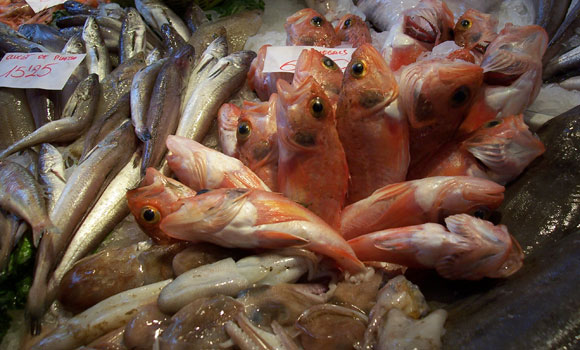

Figuring out which fish to eat these days is a "mo'brainer;" you need a pocket guide or a smartphone app just to help you remember which species are overharvested and/or contaminated. But now the truly savvy seafood shopper evidently needs a DNA test kit, too. According to Consumer Reports, nearly a quarter of the seafood we buy may be mislabeled.
And this slimy swindle has potentially serious consequences, particularly for pregnant women, children and any woman in her childbearing years who might become pregnant. If you fall into any of these categories, it's essential to avoid foods that are known to contain methylmercury, because exposure to even a little of this toxic heavy metal may harm the brain and nervous system of a fetus or child. If you are even thinking of getting pregnant, keep in mind that although methylmercury doesn't stay in our bodies as long as lead does, it can take anywhere from several months to a full year to work its way out of your system.
So, naturally, if you're a mom-to-be you'll want to steer clear of those species of fish known to contain the highest levels of methylmercury. But how are you supposed to do this if the information you're getting in restaurants and supermarkets runs a roughly one-in-four chance of being wrong?
Consumer Reports' investigation revealed that some species, such as red snapper, sole and halibut, are more commonly mislabeled than others. Salmon, catfish, cod and tuna were also misidentified, but less frequently. One sample claiming to be grouper turned out to actually be tilefish, which generally contains three times as much methylmercury as grouper.
The samples that Consumer Reports tested came from chain restaurants and stores in the tri-state region near its Yonkers headquarters, including Red Lobster, Whole Foods and Wegman's, among others. In some cases, cheaper varieties of fish were passed off as more expensive species; other labels incorrectly identified which ocean a species came from. What good does it do to know that Atlantic halibut and cod are overfished, Pacific halibut and cod less so, if sellers claim their filets hail from the Atlantic when they're really from the Pacific?
Seafood purveyors may mislabel their fish in a deliberate attempt to defraud shoppers, or to unload illegally caught fish; other mislabeling is simply due to carelessness. As Consumer Reports notes, "fish pass through many hands from hook to cook," making it that much harder to keep accurate records.
Doug Karas, a spokesman for the FDA, told Consumer Reports that it's "not acceptable" for companies to mislabel seafood products. In theory, the FDA has the authority to seize mislabeled seafood and prevent violators from selling fish. In practice, though, the burden of enforcing such regulations falls largely to state and local agencies.
However, state officials in New York, New Jersey, and Connecticut, where the tested fish were purchased, explained to Consumer Reports that "their inspectors aren't trained to differentiate among fish species and that they focus their limited resources on food safety." This means that "the likelihood of being caught is so low," as Margot Stiles, a marine scientist at the non-profit Oceana noted, that "there's no incentive to play by the rules."
NYU nutrition professor Dr. Marion Nestle characterized the fish business as "a virtually unregulated industry" in her indispensable 2006 book What To Eat, which addresses the methylmercury dilemma and provides a history of how we ended up with this regulatory hodgepodge. Lax oversight continues to be a problem, as Nestle noted in a blog post last month about a recent Boston Globe exposé which turned up the same sort of fish fraud that Consumer Reports uncovered.
I checked in with Dr. Nestle to ask her what advice she has for young mothers, pregnant women, and those who might become pregnant, in the wake of these latest revelations. Nestle thinks the current FDA guidelines for methylmercury are just fine, and offered some additional suggestions:
So, skip the sushi and learn to love smaller species such as anchovies, sardines, and herring, whose little bodies are chock full of omega 3's and can only store limited amounts of contaminants, unlike the big predatory fish who feed on them. Not all big fish are off limits, but when it comes to complicated choices like salmon and tuna, you might want to pass if you can't verify what variety and where they were caught.
And if you find it distressing that you have to do all this sleuthing about your seafood sources just to keep methylmercury out of your bloodstream, or your baby's, consider the origins of the problem. Coal-fired power plants produce nearly half the mercury emissions that pollute our waterways and find their way into our food chain. But attempts to reduce those emissions have repeatedly been stymied by the pro-coal cabal, which claims that stricter regulations will "kill jobs" and harm productivity.
In fact, as Moms Clean Air Force co-founder Dominique Browning pointed out last week, a coal industry executive recently admitted that requiring coal-powered plants to install scrubbers that reduce the toxins they emit would actually create jobs.
And if we can stop our power plants from spewing the mercury that's fouling our waterways, maybe someday our kids will be able to order the grilled grouper without having to grill the waiter first.
Crossposted from Moms Clean Air Force.